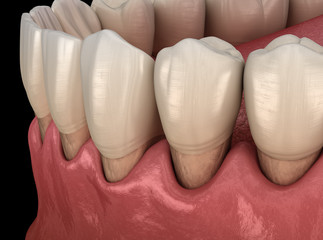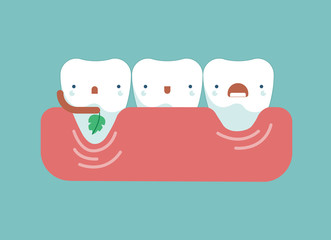Gums have the main role of anchoring the teeth to the jaw and protecting the roots from bacteria and plaque. Once gums deteriorate or start to recede, they negatively affect the teeth and body’s overall wellness. Gum recession is a process whereby surrounding tissue pulls away from a tooth, exposing more of its root or the tooth itself.

What Is a Gum Graft?
Considered to be a leading treatment for receding gums, gum grafting is the collective name that refers to all the dental surgical procedures that aim to cover an overexposed tooth root surface with grafted tissue. The procedure may sound more painful and complicated than it really is. Through a gum graft, you can protect your teeth from negative effects caused by gum recession, this will also improve the aesthetics of your smile.
Symptoms of Receding Gums
Teeth that appear larger than normal
Highly sensitive teeth
Exposed or visible tooth roots
Loose teeth
Increased gaps between teeth
Bad breath
Teeth that feel rough at the gum line
Tooth decay below the gum line
Bleeding gums
Change in the color of teeth
Additional Cause Factors
Periodontal disease: Periodontal disease can wreak havoc on your gum tissue. Bacteria in dental plaque is what causes periodontal disease. The bacteria gradually collects and multiplies, forming a biofilm. When this plaque is left on the teeth, it directly affects the gums. When the gum line has receded to a certain extent because of periodontal disease, your dentist may suggest a gum graft.
Aggressive tooth brushing: Although many think that this is not a viable reason for receding gums, brushing your teeth too hard or in the wrong way causes wear on the gums.
Hormonal changes: Fluctuations of female hormone levels that may occur in adolescence, pregnancy or menopause can make gums highly sensitive and more vulnerable to gum recession.
A misaligned bite: When teeth are not even, too much force can be placed on the gums or bone, allowing gums to recede.

Types of Gum Recession
Mild Recession:
Receding gums can be easily treated. In cases of mild recession, the dentist will first deep-clean the affected area to reverse receding gums. This involves the removal of tartar or plaque build up on the teeth and gum line. During this process, the exposed root areas and pockets are smoothed out to prevent further accumulation of bacteria.
Severe Recession:
This type of recession cannot be treated with deep cleaning only. Dentists often opt for gum surgery as severe recession causes loss of bone and formation of very deep pockets. Although these are the best ways to reverse receding gums, it is important to understand that there are times when deep cleaning or surgery may not be able to reverse gum recession.
How To Prevent Further Gum Recession
To avoid gum recession from progressing, it is important for a dentist to develop a plan that will allow you to stop the recession in its tracks. Therefore, to ensure that you remain on the healthy end of the spectrum, follow these further prevention tips:
Wear a mouthguard when you sleep
Although a mouth guard may not sound flattering, its purpose is to protect your teeth from grinding at night. However, it is important to choose the type of mouthguard that will work best for you.
Use proper brushing methods
Brush your teeth gently twice daily. Do not be aggressive when brushing and do not brush multiple times in a day. This may make your teeth enamel wear off. Remember to replace your toothbrush every three months.

Treat periodontal disease in its early stages
To prevent further damage to your gum or bone tissues, periodontal disease should be treated as soon as it occurs. This will prevent it from advancing. Mild cases of the disease only require deep cleaning while severe cases call for surgery. If you notice that your teeth look longer or feel any excessive sensitivity in your gums, do not wait to see your dentist for advice and treatment, do it immediately.
Eat foods that will strengthen your gums
Nutrition is a major component of having optimal oral health. Highly nutritious, vitamin-rich foods maintain healthy and strong bones and teeth. Calcium and phosphorus are important components in our diets. Vitamin D, magnesium and zinc also play a role in strengthening gums.
Visit the dentist twice a year
Even if you take care of your gums and overall oral hygiene, a dentist can always spot problems that may be developing. As such, he or she will be able to prevent the problem from getting worse.
The good news is that bone tissue can always remineralize. Taking care of receded gums early will allow the jaw to remineralize.
Gum Recession Surgeon
Recession of gums can have a serious impact on your overall health. The teeth rely on the gums for protection against dangerous plaque and bacteria. The biggest problem with recession is that it happens slowly and that it may take time to be detected.
Thankfully, gum grafting is a procedure that has offered a reliable solution for gum recession near Allen, TX. It identifies the problem, restores tissue and allows for the bone to remineralize. Needless to say, healthy gums are the first step to a long-lasting, healthy smile.

